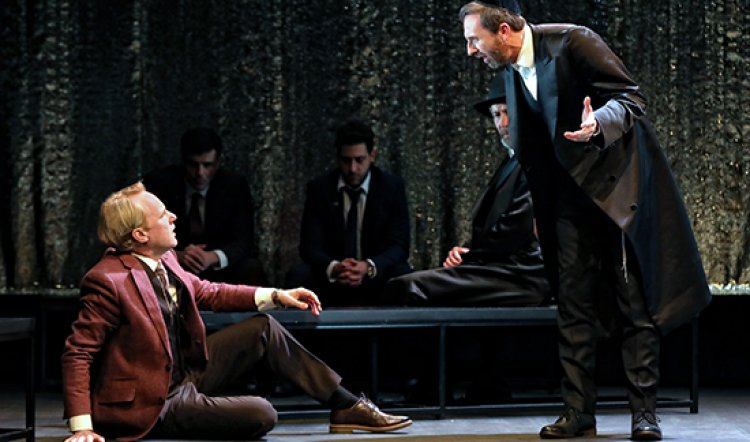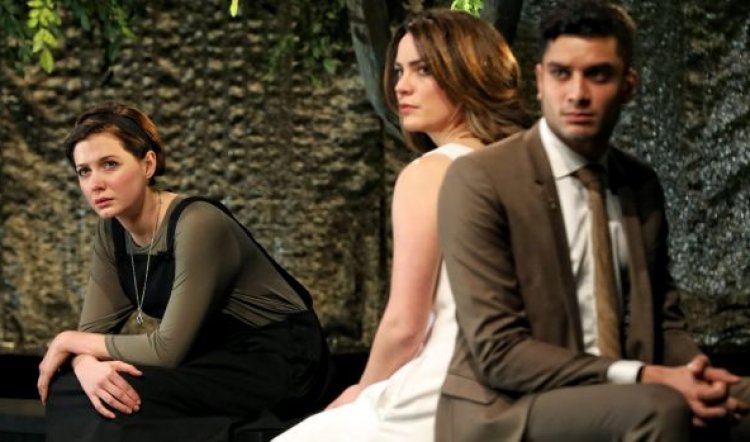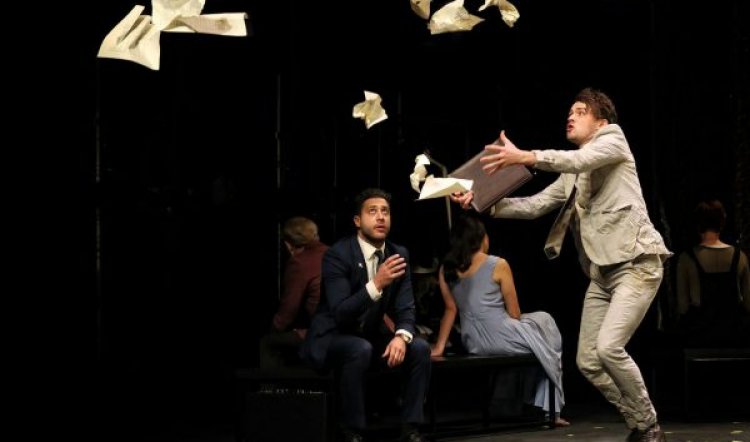
THE MERCHANT OF VENICE
THE MERCHANT OF VENICE, Bell Shakespeare Company at the Playhouse, Sydney Opera House, 24 October-26 November 2017. Photography by Prudence Upton: above - Jo Turner and Mitchell Butel; below - Felicity McKay, Jessica Tovey and Shiv Palekar; below again - Jacob Warner
This is the best production of The Merchant of Venice I’ve seen in %$#* decades of pesky, unresolved and unsatisfactory Merchants. It’s come home to the Playhouse after a long tour yet is taut and energetic. And enthralling, as the play begins with an uncompromising statement when the company kneels and piously recites The Lord’s Prayer.
Close by but excluded are Shylock the Jew (Mitchell Butel) and his daughter Jessica (Felicity McKay). Around the necks of the Gentiles hang small yet prominent silver crucifixes. These seem at odds with their snazzy suits and are a deliberate yet less authentic assertion of identity than Shylock’s elegant black overcoat, tzitzit and yarmulke.
Directed (and deftly edited) by Anne-Louise Sarks, the crystal-clear intent of this production is presented in these scant minutes, and full realisation follows over the next two hours in what is gradually revealed as a remarkable achievement. Extraneous characters have been omitted, clarity and purpose is given to each actor and they grab the three dimensions with both hands and deliver.
The politics of the play are stark: this is not an anti-Semitic play, it is a play about anti-Semitism; it is also about human rights and the rights of women – the absence of both and the unthinking, heedless patriarchal power that is at the heart of all these ills of western society.
As Portia (Jessica Tovey) and Nerissa (Catherine Davies) navigate their way through the jungle of eligibility, property and domination otherwise known as the marriage market, the men of Venice go about their business of the money market: buying, selling, gambling and carousing and – when extravagance goes too far – the despised last resort of borrowing from Shylock.

Antonio (Jo Turner) is the strutting main man, Bassanio (Damien Strouthos) is his sidekick and also beholden to him, while Gratiano (Anthony Taufa) is a classic wide boy of the Bourse beside the more equivocal Lorenzo (Shiv Palekar) and Eugene Gilfedder makes much of his three support roles. They can be seen most days swaggering the streets of Sydney’s CBD. Bromance, bullying and bonhomie are their way of life.
In the eye of the storm is the painfully dignified Shylock – a life-enhancing performance by Mitchell Butel. In the course of his dealings with the “Christians” this man is spat upon, humiliated, tormented and ultimately pushed to revenge, pushed to demands beyond his beliefs – the pound of flesh to be forfeit for the bad loan – and, by the end of the play, it’s impossible to be on the wrong side of this history.
It must be said, however, that this Merchant is not grimly tragical. Shakespeare is notoriously sly with his injections of jokes and comical aspects and this production delivers the necessary leavening that lifts it to spectacularly memorable. In particular, Jacob Warner is the epicentre of the play’s comedy as the goofy Launcelot Gobbo, while Portia and Nerissa make merry business with their quick change from gals to guys.
The moments of laughter serve to highlight and enhance the fundamental darkness of the play, however, and in my experience it has never been more profoundly disturbing. As the cocksure men taunt Shylock it was impossible not to think of Sam Dastyari’s recent encounter with racist morons: so empowered did they feel they actually filmed and distributed evidence of their behaviour on Facebook. And so it is with these wretched Venetians and their superiority and sense of entitlement. The similarity is breathtaking – and therein lies the tragedy.
As Shylock finally so famously asks, “If you prick us, do we not bleed? If you tickle us, do we not laugh? If you poison us, do we not die? And if you wrong us, shall we not revenge?”s

It is the idea of tickling that is somehow most painfully sad.
Further enhancing the Sarks vision is Michael Hankin’s design and Paul Jackson’s lighting. The costumes strengthen the characters while the set is designed to travel and fit into a variety of venues. A simple glittering backdrop is fronted by a semi-circle of plain benches and a single tree. A raging tempest is effected via a powerful fan and metallic coloured streamers.
On a wheeled table at the middle of the benches, to be brought forward when necessary, are the three chests – gold, silver and lead. These will seal Portia’s marital fate if one of her suitors picks the right one to open. Gulp. And meanwhile, composer and sound designer Max Lyandvert wraps all in aural atmospherics and further underlines meaning.
All in all, Anne-Louise Sarks and her crew (all on stage and very effectively so) have unpacked a treasury of drama and eloquence from a play that is more often obscured or derailed. It’s a great achievement and you should treat yourself to it while you can. Including the director’s cheeky take on how to end the play, which will bring a lump to most throats and infuriate the purists. Heh heh. Totally recommended.



